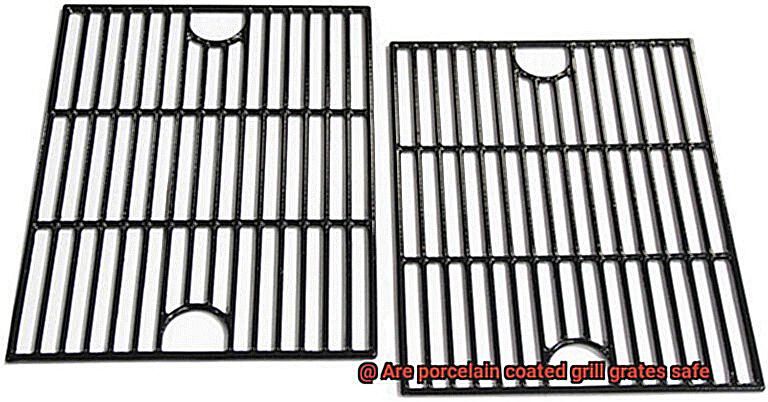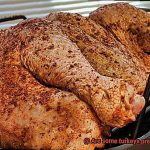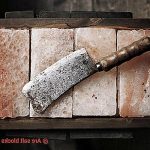The sizzle of a grill and the smell of smoky meat – nothing beats a summer barbecue with family and friends. But before you start flipping burgers, it’s essential to know that your grill grates play a crucial role in the cooking process. With so many options out there, you might be wondering: Are porcelain coated grill grates safe?
Porcelain-coated grill grates are popular for their non-stick surface and easy clean-up. However, some people worry about chipping or flaking of the porcelain coating and the potential release of harmful substances that could contaminate their food.
So, what’s the deal? Are porcelain coated grill grates safe to use? In this blog post, we’ll dive into the science behind these grates to answer all your burning questions. We’ll discuss the pros and cons of using them, safety concerns you should be aware of, and how you can minimize any risks.
Whether you’re a seasoned pro or just starting out on your grilling journey, this post will give you all the information you need to make an informed decision about using porcelain coated grill grates. So let’s fire up those barbecues and uncover the truth about these popular grill grates.
Contents
Pros and Cons of Porcelain Coated Grill Grates
These grates come with various benefits that make them stand out from the rest. One of the most significant advantages of porcelain coated grill grates is their non-stick feature, which makes grilling and cleaning up afterward much more manageable. The porcelain coating prevents food from sticking to the grates, resulting in better-tasting meals and less frustration during cleanup.
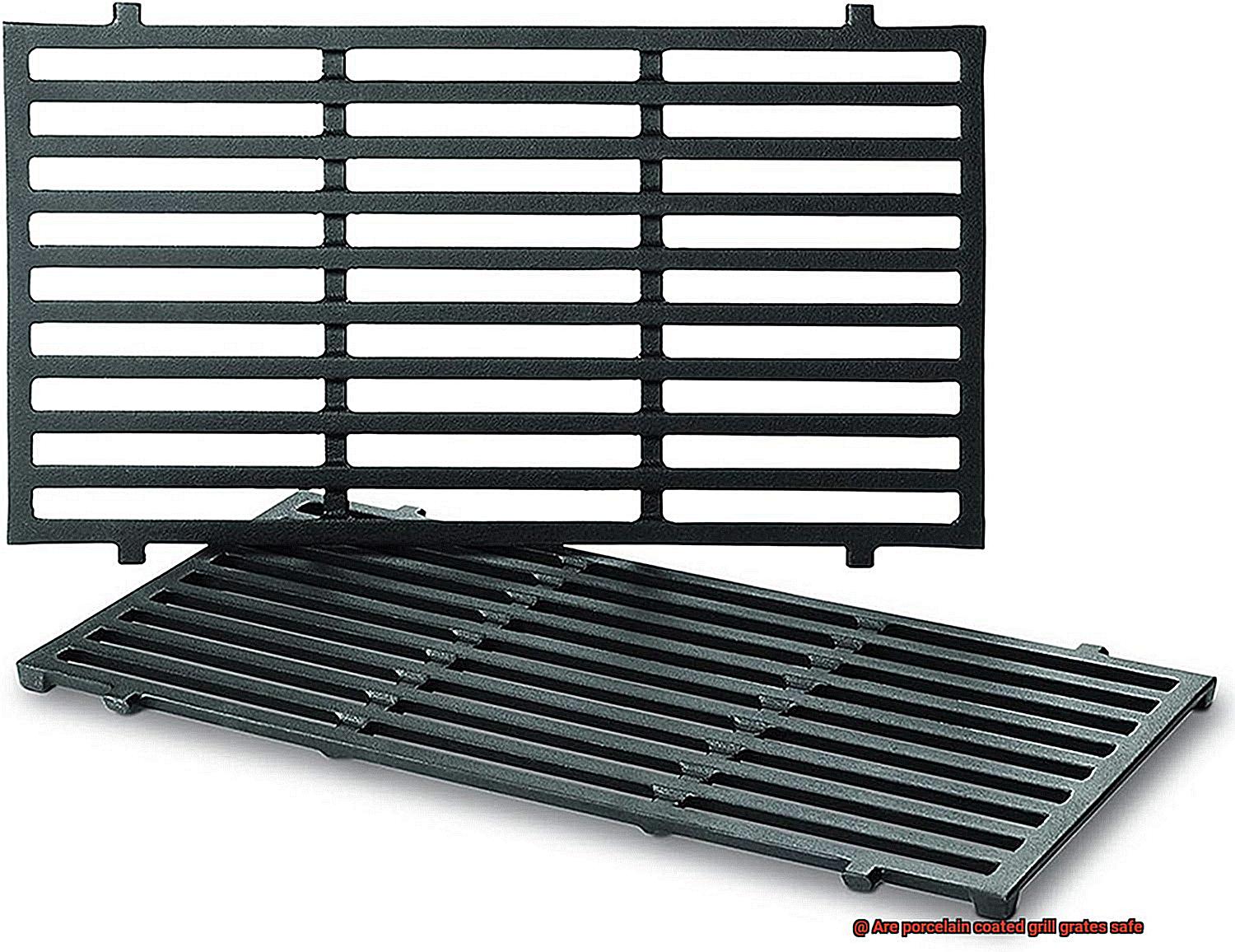
Another benefit of these grill grates is their ability to distribute heat more evenly than other types of grates. This even distribution means that food cooks uniformly and consistently, resulting in delicious meals every time. Additionally, the porcelain coating protects the grill grates from rusting, which can prolong their lifespan and save you money in the long run.
While porcelain coated grill grates have many benefits, they also come with some potential drawbacks that need consideration. One issue is that the coating can chip or crack over time, especially if exposed to high heat or not properly cared for. Once the coating is damaged, it exposes the underlying metal, which can rust and potentially contaminate your food.
Furthermore, the non-stick surface may not be ideal for certain types of cooking methods such as searing or charring due to its inability to hold up well under high heat. Therefore, before deciding whether porcelain coated grill grates are right for you, it’s essential to consider your specific cooking needs.
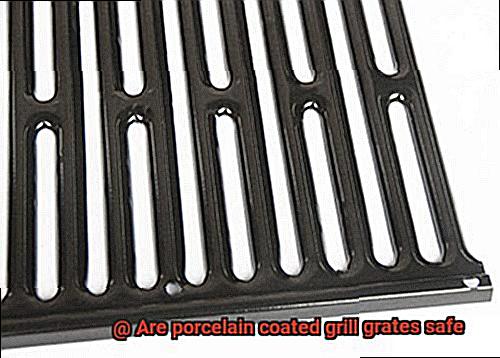
While porcelain is generally considered safe for cooking, there are concerns about potential health risks associated with prolonged exposure to high temperatures. When heated, porcelain can release fumes that may be harmful if inhaled or contaminate the food being cooked. To minimize any potential health risks and ensure proper care of your porcelain coated grill grates, it is crucial to take precautions when using them. This includes ensuring proper ventilation when grilling, avoiding overheating the grates, and regularly inspecting them for chips or cracks.
Potential Health Risks Associated with Porcelain Coated Grill Grates
Grilling is a beloved pastime for many, and porcelain coated grill grates have become a popular choice for their ability to distribute heat evenly and resist rust and corrosion. However, it’s essential to understand the potential health risks associated with using these types of grill grates.
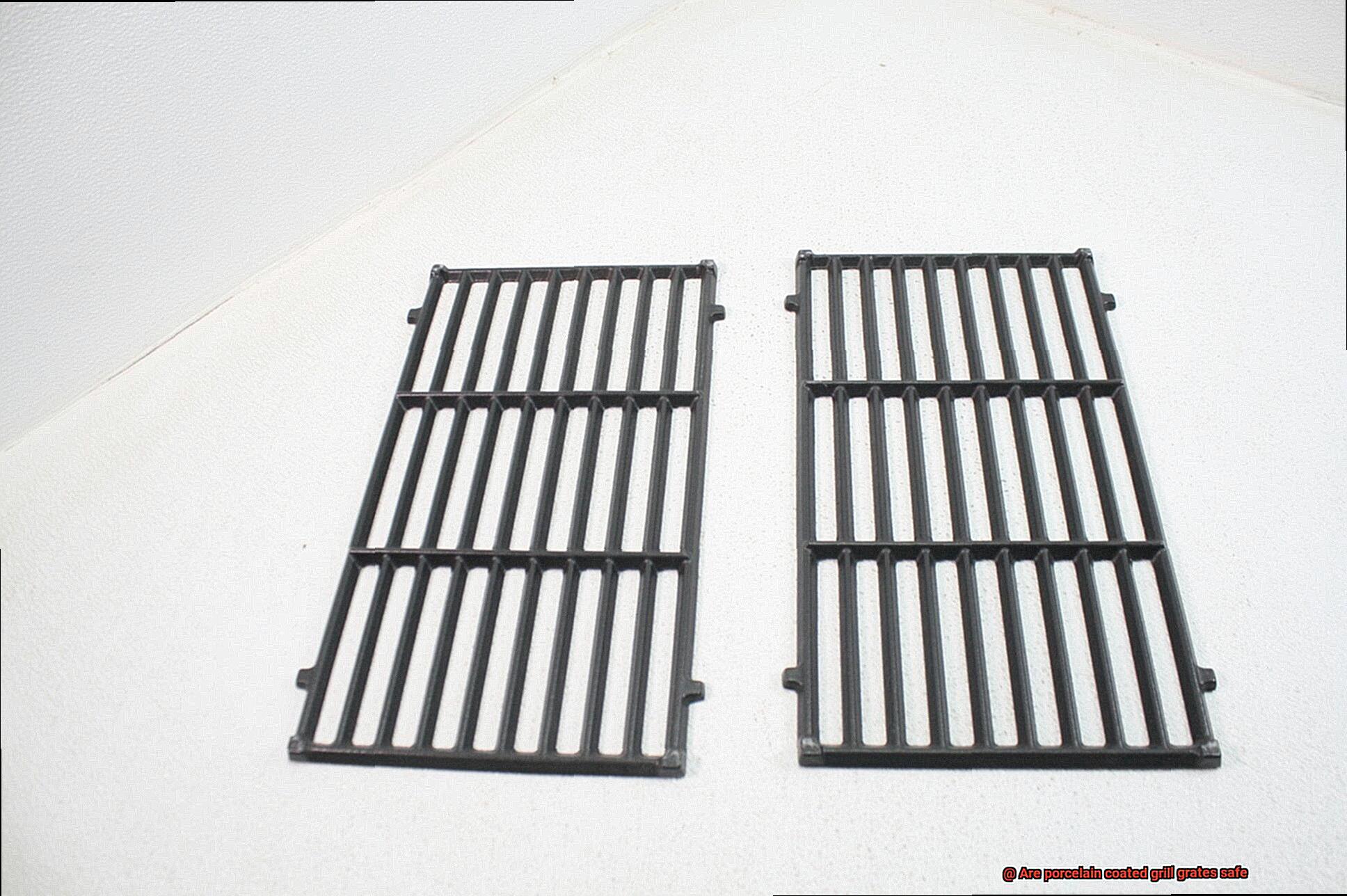
One of the most significant concerns is the release of harmful chemicals when the porcelain coating is heated to high temperatures. As the coating chips over time, the metal underneath can come into contact with food and release toxic substances such as lead, cadmium, and other heavy metals that have been linked to cancer and other health problems. It’s important to note that the risk can vary depending on the quality of the porcelain coating and the type of grill used.
Another potential health risk associated with porcelain coated grill grates is the buildup of grease and food particles on the surface. If not cleaned properly, these particles can harbor harmful bacteria that can cause foodborne illnesses.
To reduce these health hazards, it’s crucial to properly clean and maintain your grill grates after each use. This includes scrubbing off any grease or food particles and avoiding harsh cleaning chemicals that could damage the coating. It’s also important to choose high-quality porcelain coated grill grates that use safer materials in their coatings.
Quality of Porcelain Coatings
Grilling is a beloved pastime that brings people together. To ensure a safe and enjoyable experience, it’s important to prioritize safety when it comes to your equipment. Porcelain coated grill grates have become increasingly popular for their even heat distribution and resistance to corrosion. However, not all coatings are created equal, and the quality of the coating is crucial to ensure safety.
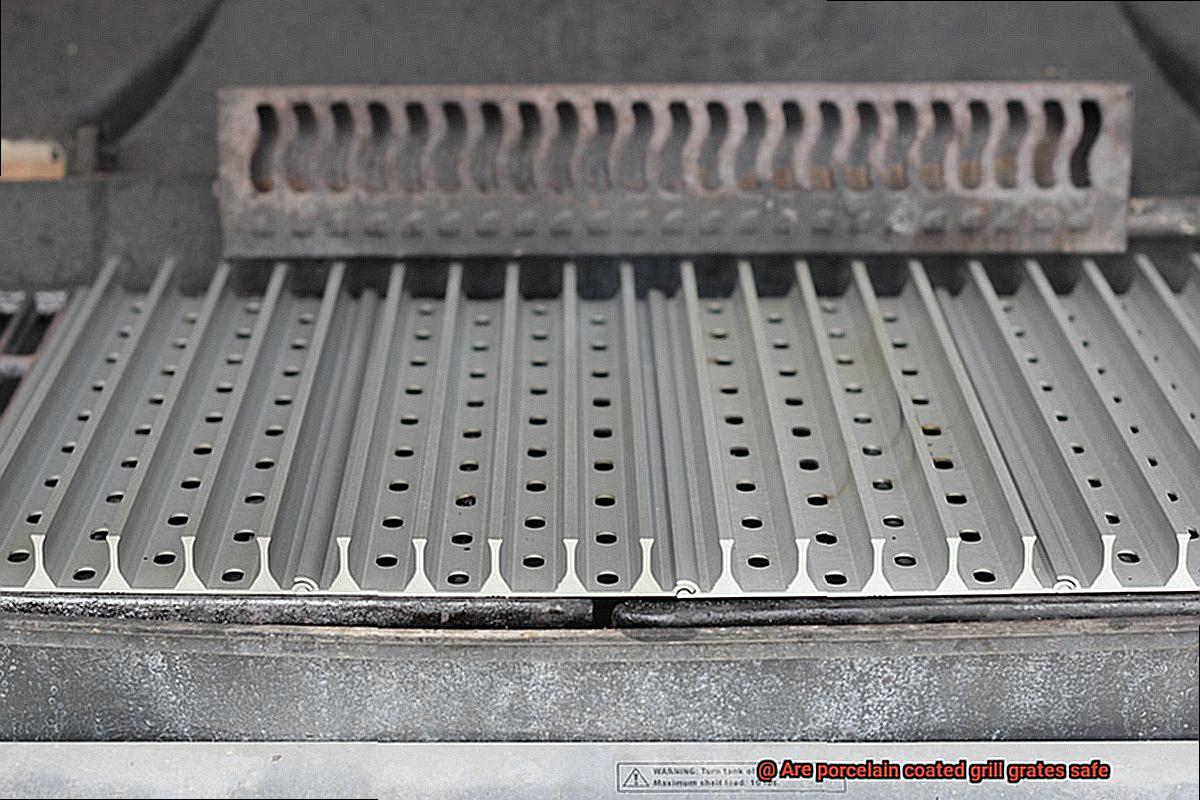
As an expert in the quality of porcelain coatings, I have some tips on how to assess the safety and durability of these grill grates. Poor quality coatings can chip or crack, exposing the metal underneath and potentially contaminating your food with harmful chemicals. That’s why it’s important to look for high-quality coatings that are free from lead, cadmium, and other harmful substances. In addition, thicker coatings tend to be more durable and less likely to chip or crack.
To determine the quality of a porcelain coating, look for certifications from reputable organizations such as the National Sanitation Foundation (NSF) or Underwriters Laboratories (UL). These certifications indicate that the coating has been tested and meets certain safety standards. With these certifications, you can have peace of mind knowing that your porcelain coated grill grates are safe for use.
Proper maintenance is also crucial for ensuring longevity and safety. Regularly cleaning your grill grates with a non-abrasive cleaner can help prevent buildup that could damage the coating. It’s essential to avoid using harsh chemicals or wire brushes that can scratch or damage the coating.
Tips for Safely Using Porcelain Coated Grill Grates
Grilling is a favorite outdoor activity for many people, especially during the summer months. Porcelain coated grill grates are a popular choice because of their non-stick surface and even heat distribution. However, it’s important to use them safely to avoid any potential hazards.
Tip #1: Clean the Grates Thoroughly Before and After Use
Proper cleaning is essential for safe grilling. Any leftover food or debris on the grates can cause flare-ups, leading to potential injury or damage to the grill. Use a stiff wire brush or scraper to remove any stubborn residue before and after use.
Tip #2: Avoid Using Metal Utensils on the Porcelain Coating
Metal utensils can scratch and damage the porcelain coating, leading to rust or other damage. Instead, opt for softer materials such as silicone or wood when cooking on porcelain coated grill grates.
Tip #3: Be Mindful of High Temperatures and Sudden Temperature Changes
Porcelain coated grates can crack or chip if exposed to extreme heat or cold. Allow them to cool down before cleaning or handling. Also, avoid placing cold food on hot grates as this can cause sudden temperature changes that may damage the coating.
Tip #4: Use Gentle Cleaners and Avoid Abrasive Chemicals
Avoid using abrasive cleaners or harsh chemicals on the porcelain coating as they can damage the surface and potentially cause harm if ingested. Instead, use a soft-bristled brush or sponge and a mild detergent to clean the grates.
Tip #5: Follow the Manufacturer’s Instructions for Proper Care and Maintenance
Different manufacturers may have different care instructions for their porcelain coated grill grates. Always follow the instructions provided by the manufacturer for proper care and maintenance to ensure their longevity and safety for future use.
How to Inspect Your Porcelain Coated Grill Grates
Grilling is a beloved activity that brings family and friends together, but it’s important to make sure that your grill is safe to use. Porcelain coated grill grates are a popular choice among grill enthusiasts due to their durability and ease of maintenance. However, it’s crucial to regularly inspect and maintain your grill grates to ensure they remain safe for use.
Clean Your Porcelain Coated Grill Grates Thoroughly:
The first step in inspecting your porcelain coated grill grates is to clean them thoroughly. Use a wire brush or scraper to remove any leftover food or debris on the grates, and then wipe them down with a damp cloth to remove any remaining residue. This will make it easier to spot any damage to the porcelain coating.
Check for Damage on the Porcelain Coating:
Inspect the porcelain coating carefully for any chips, cracks, or discoloration. If you notice any damage to the coating, it’s important to address it immediately because it can lead to rust and corrosion. Rust can weaken the metal underneath the coating, making it more prone to damage and potentially unsafe for use.
Repair Options:
If you do notice any damage to the coating, there are a few options for addressing it. One option is to use a porcelain repair kit that you can find at most hardware stores. These kits usually come with a special paint that you can apply to the damaged area to restore the coating. Alternatively, if the damage is severe or you’re not comfortable trying to repair it yourself, you may need to replace the grill grates altogether.
Handle Your Grill Grates with Care:
In addition to regular inspection and maintenance, it’s important to handle your porcelain coated grill grates with care. Avoid using metal utensils that can scratch or damage the porcelain coating. Instead, use silicone or nylon utensils that won’t scratch the surface.
Regular Cleaning:
Lastly, regular cleaning is essential to prevent buildup of grease and food particles on the grates. Use a grill brush or scraper to remove any debris from the grates before and after each use. You can also soak the grates in warm soapy water and scrub them with a non-abrasive sponge or cloth.
Proper Ventilation When Grilling
Before you fire up your grill, make sure you’re taking the necessary steps to ensure proper ventilation. Grilling produces smoke and grease, which can pose a serious safety hazard if not properly ventilated.
Here are some reasons why proper ventilation is crucial when grilling:
- Fire hazard: If your grill is positioned in an enclosed or poorly ventilated area, the smoke and grease can accumulate and ignite, creating a dangerous situation for you and your guests.
- Health concerns: The smoke produced by grilling can cause respiratory issues and eye irritation, especially for those with preexisting health conditions.
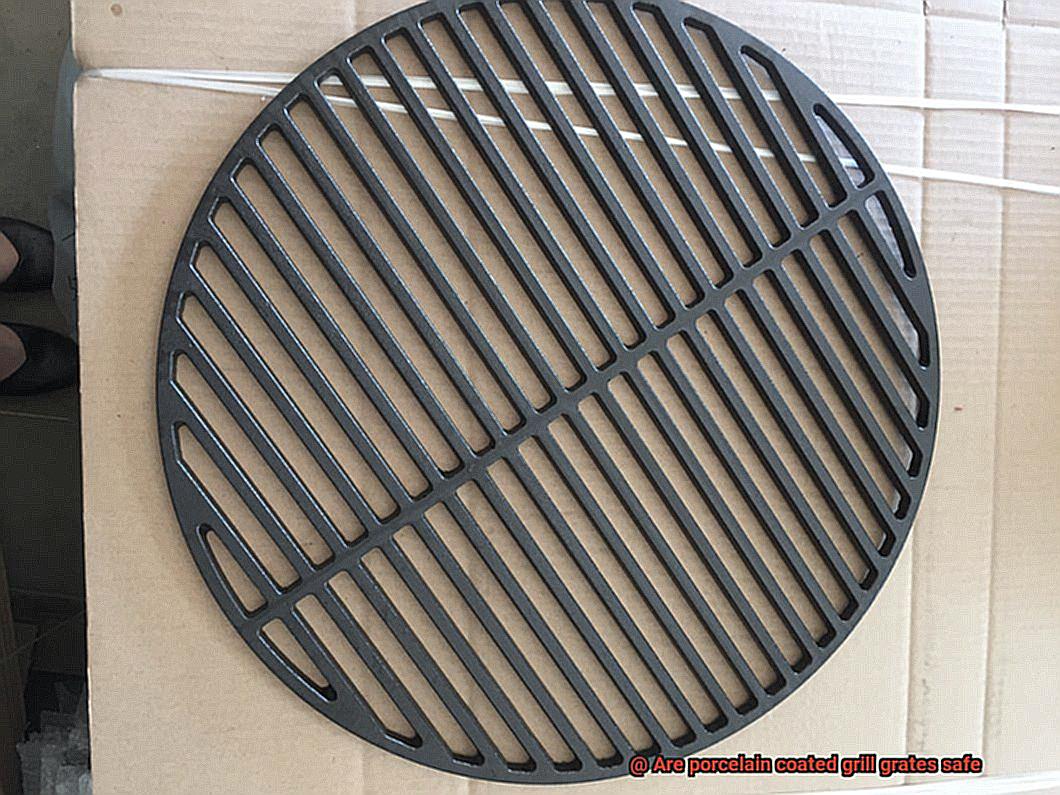
To avoid these risks, follow these tips for proper ventilation when grilling:
- Position your grill in an open area with plenty of space around it. This allows the smoke to dissipate and reduces the risk of fire.
- Keep your grill’s hood open while cooking. This allows the smoke and grease to escape and prevents them from accumulating inside the grill.
- Consider investing in a smoke extractor if your grill doesn’t have a hood. This device can help remove smoke and fumes from the air.
- Clean your grill regularly to prevent grease buildup that could obstruct ventilation. Scrape off excess food or grease after each use, and deep clean the grill at least once per season.
Avoiding Overheating the Grill Grates
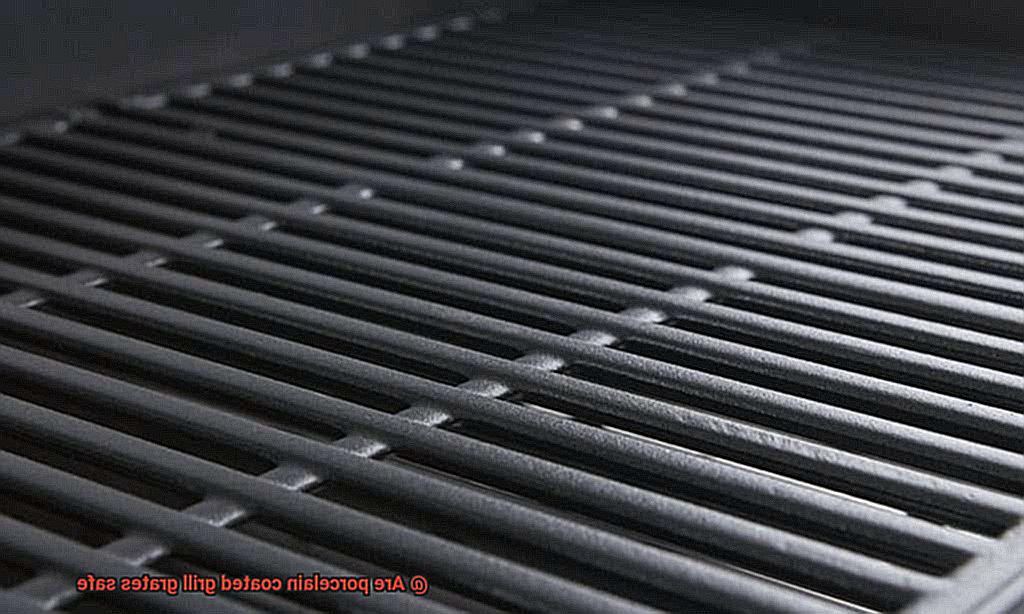
Grilling is a beloved American pastime that brings family and friends together over delicious, smoky meals. However, if you are the proud owner of a porcelain-coated grill, you may be concerned about overheating your grill grates. Overheating can cause the porcelain coating to crack or chip, which not only affects the appearance of your grill but can also pose a safety risk to your food.
To avoid these issues, follow these tips for avoiding overheating your porcelain coated grill grates:
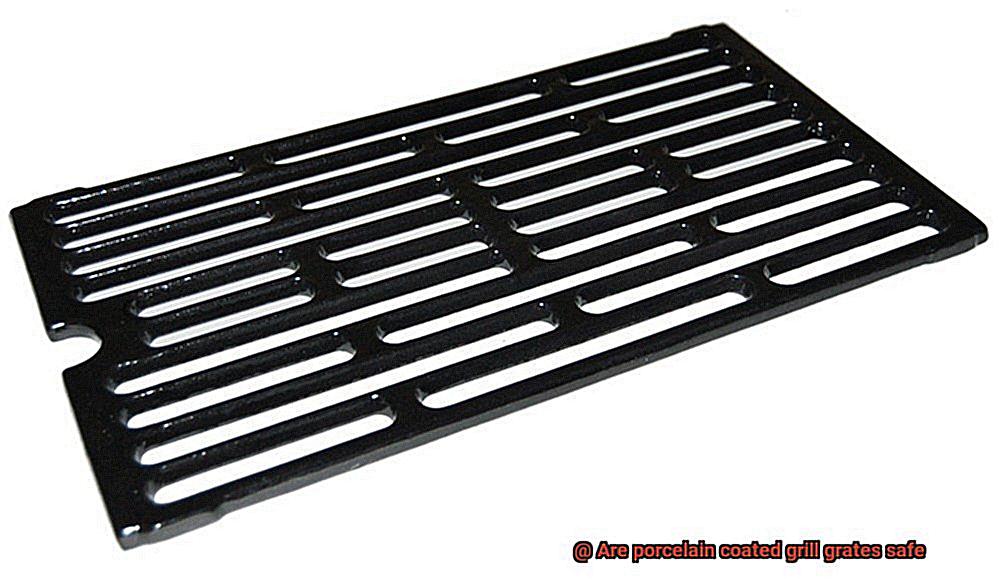
- Gradual Preheating: Before you start cooking, preheat your grill on a medium heat setting and allow the grates to warm up gradually. This will help prevent them from overheating and cracking.
- Adjust Heat as Needed: Once the grill is preheated, adjust the heat required for your desired cooking temperature. Monitor the temperature throughout the cooking process and make adjustments as needed.
- Avoid High Heat Cooking Methods: While searing or blackening may be tempting, high-heat cooking methods require extremely high temperatures that can harm the porcelain coating. Instead, try using indirect grilling or other low-heat methods.
- Regular Cleaning: Proper cleaning and maintenance of your porcelain coated grill grates is crucial for preventing overheating. Use a grill brush and warm soapy water to remove grease and debris buildup that can cause hot spots and damage the coating.
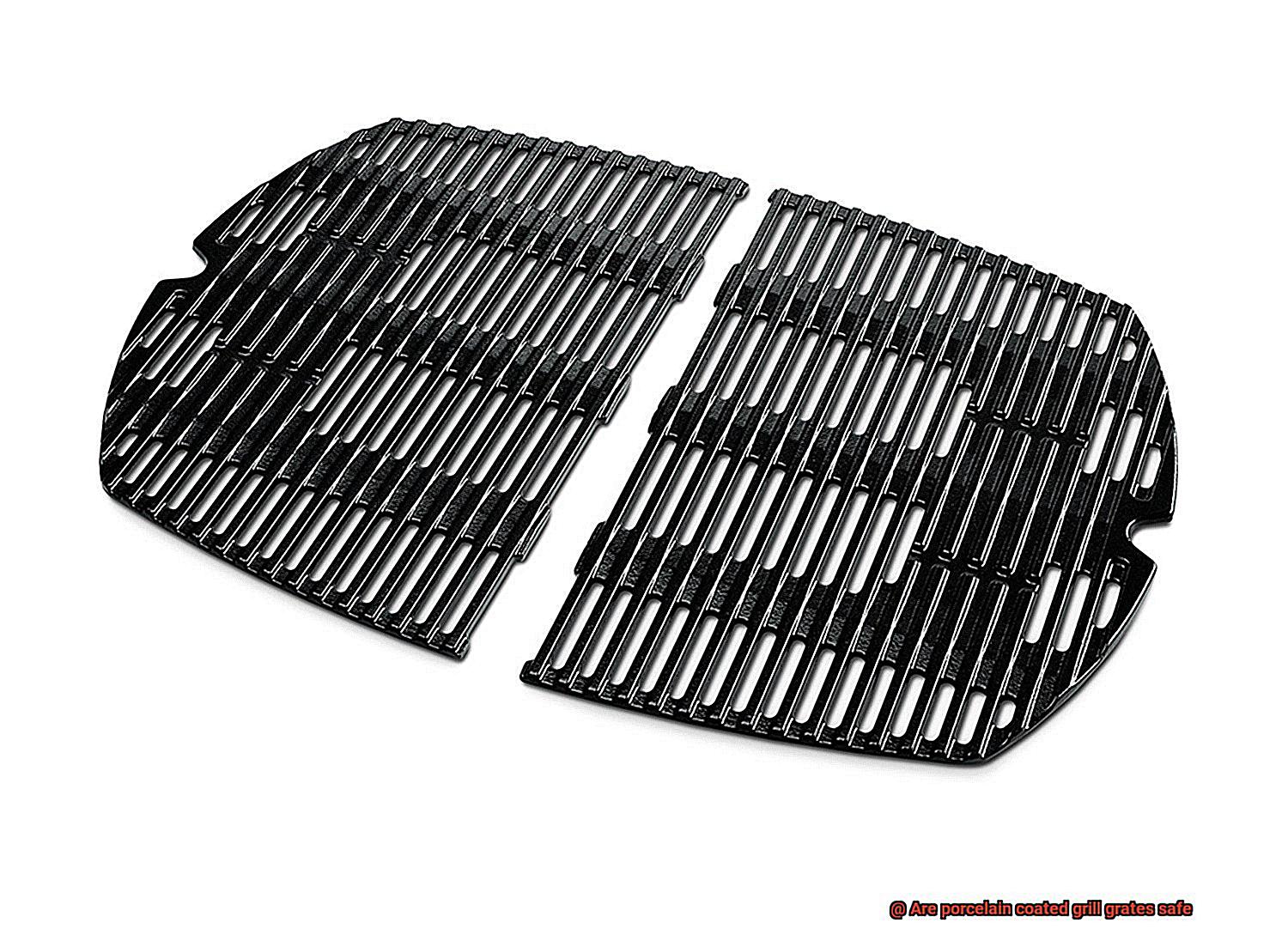
Benefits of Using Porcelain Coated Grill Grates
Grilling is an art that requires precision and attention to detail. That’s why porcelain-coated grill grates have become increasingly popular among grill enthusiasts. These grates offer numerous benefits that make grilling a breeze, making them a must-have for any BBQ lover.
One of the most significant benefits of using porcelain-coated grill grates is their non-stick feature. The coating prevents food from sticking to the grates, which is particularly useful when grilling delicate foods like fish and vegetables. This feature also makes cleaning up a breeze. A quick wipe down with a damp cloth is all you need to keep your porcelain-coated grill grates in top shape.
In addition to being non-stick, porcelain-coated grill grates are incredibly durable. The coating protects the metal from rust and corrosion, which prolongs the life of the grates. This makes them an excellent long-term investment for those who grill frequently.
Porcelain-coated grill grates also distribute heat evenly across the surface. The smooth surface of the coating promotes even heat distribution, ensuring that the food cooks uniformly. This feature is particularly useful when cooking large cuts of meat that require consistent heat distribution to cook properly.
Another benefit of using porcelain-coated grill grates is their hygienic nature. The smooth surface of the coating prevents bacteria from growing on the grates, ensuring that the food cooked on them is safe for consumption. Additionally, the non-stick feature of the coating prevents food particles from sticking onto the grates, making them easier to clean and maintain.
d7qbFNSDUnI” >
Conclusion
As we wrap up our discussion on the safety of porcelain coated grill grates, it’s important to note that while they are generally safe to use, precautions must be taken to ensure their longevity and your health. With benefits such as non-stick surfaces and even heat distribution, these grates are a popular choice for many grill enthusiasts. However, it’s essential to keep in mind that prolonged exposure to high temperatures and damage to the coating can pose potential health risks.
To maintain the safety of your porcelain coated grill grates, regular inspections are necessary to check for any chipping or cracking. Overheating should also be avoided, and proper cleaning and maintenance procedures should be followed. Adequate ventilation is crucial when grilling to reduce any potential hazards.
Investing in high-quality coatings free from harmful substances can further reduce risks associated with using porcelain coated grill grates. By following these tips and taking good care of your grill grates, you’ll be able to enjoy delicious grilled meals all summer long without worrying about any safety concerns.

